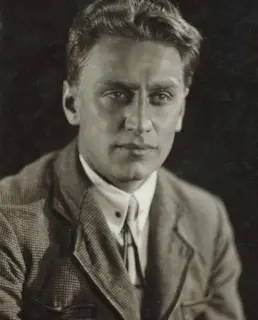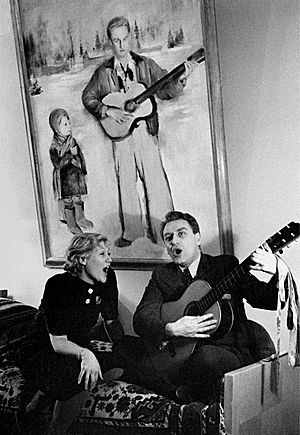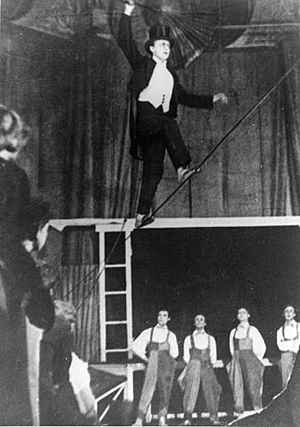Grigori Aleksandrov facts for kids
Quick facts for kids
Grigori Aleksandrov
Григо́рий Алекса́ндров |
|
|---|---|

Grigori Aleksandrov in his 30s
|
|
| Born |
Grigori Vasilyevich Mormonenko
23 January 1903 Yekaterinburg, Yekaterinburgsky Uyezd, Perm Governorate, Russian Empire
|
| Died | 16 December 1983 (aged 80) |
| Resting place | Novodevichy Cemetery, Moscow |
| Nationality | Russian |
| Other names | Grigori Vasilyevich Aleksandrov |
| Occupation | Actor, Director, Screenwriter |
| Spouse(s) |
Olga Ivanova
(m. 1925–1933)Galina Krylova
(m. 1979) |
Grigori Vasilyevich Aleksandrov (born Mormonenko; 1903–1983) was a famous Soviet film director. He was recognized as a People's Artist of the USSR in 1947 and a Hero of Socialist Labour in 1973. He also won the Stalin Prizes in 1941 and 1950.
Aleksandrov first worked closely with director Sergei Eisenstein. He was a co-director, screenwriter, and actor in Eisenstein's films. Later, in the 1930s, Aleksandrov became a major director on his own. He directed popular musical comedies like Jolly Fellows. Many of these films starred his wife, Lyubov Orlova.
Aleksandrov continued to make films throughout his life. However, his musicals are still his most famous works. These films were some of the first musicals made in the Soviet Union. They are known for being cheerful and fun, showing a lighter side of the Stalin era in the USSR.
Contents
Early Life and Working with Eisenstein
Grigori Aleksandrov was born Grigori Vasilyevich Mormonenko in Yekaterinburg, Russia, in 1903. From the age of nine, he worked various jobs at the Ekaterinburg Opera Theater. He eventually became an assistant director. He also studied violin at the Ekaterinburg Musical School and graduated in 1917.
After studying directing and briefly managing a movie theater, Aleksandrov moved to Moscow. In 1921, he met Sergei Eisenstein while acting with the Proletcult Theatre. In 1923, Aleksandrov played the main role in Eisenstein's play Enough Stupidity in Every Wise Man. He also appeared in Eisenstein's first short film, Glumov's Diary, which was part of the play.
Eisenstein and Aleksandrov worked together on several plays. Then, Eisenstein made his first full-length film, Strike. Aleksandrov helped write the script for this film. Next, they worked on Eisenstein's famous film Battleship Potemkin. In this movie, Aleksandrov played Ippolit Giliarovsky.
Aleksandrov co-directed Eisenstein's next two films: October: Ten Days That Shook the World and The General Line. These were their last films from the silent era.
In the early 1930s, Aleksandrov went to Hollywood with Eisenstein and their cinematographer, Eduard Tisse. They also traveled to Mexico to film a project that Eisenstein never finished. Aleksandrov later put together an edited version of this footage in 1979, called ¡Que viva México!.
Making Musical Comedies
In 1932, Aleksandrov returned to the Soviet Union because Joseph Stalin ordered him to. The next year, he directed a film that supported Stalin, called International. After meeting with Stalin and Maxim Gorky, Aleksandrov started making the first Soviet musical, Jolly Fellows.
This film starred Leonid Utyosov and Lyubov Orlova. Aleksandrov later married Orlova. She became the star of his most successful films, including Circus, Volga-Volga, and Tanya.
During World War II
When World War II started for the Soviet Union in June 1941, Aleksandrov and his wife Orlova were on vacation. They quickly returned to Moscow. During an air raid by the Nazis, Aleksandrov was injured.
In late 1941, Aleksandrov and Orlova, along with other Mosfilm studio employees, moved to Alma-Ata, in the Kazakh SSR. Soon after, Aleksandrov was sent to Baku, Azerbaijan, to manage a local film studio. There, he and Orlova made a film called A Family. However, this film was not allowed to be shown in theaters. The authorities felt it did not show the Soviet people's fight against the German invaders well enough. In September 1943, Aleksandrov was ordered back to Moscow to become the main manager of Mosfilm studio.
After World War II
Aleksandrov's first film after the war was Springtime. This was another musical comedy starring Lyubov Orlova. It also featured other great actors like Nikolay Cherkasov and Faina Ranevskaya. He also made a movie about the Russian composer Mikhail Glinka.
Aleksandrov and Orlova were very popular in the Soviet Union. Even though Stalin liked their films (he even gave a copy of Volga Volga to U.S. President Franklin D. Roosevelt), he sometimes treated them poorly.
From 1951 to 1957, Aleksandrov taught directing at VGIK, a film school. Leonid Gaidai was one of his students. Aleksandrov also made several films about the years leading up to the Russian Revolution, including some about Vladimir Lenin.
The Khrushchev Thaw Period
After Stalin's death, the Soviet Union became a bit more open, a period known as the "Khrushchev Thaw". Surprisingly, Aleksandrov found it harder to work during this time. He even faced criticism for his success during the Stalin era. His 1960 movie Russian Souvenir received very harsh reviews. A satirical magazine called Krokodil published a critical article about it.
Other publications also started criticizing the film. However, Aleksandrov's friends and colleagues defended him. The newspaper Izvestia published a letter supporting Aleksandrov, signed by famous people like Dmitri Shostakovich. After this, the attacks on Aleksandrov stopped, but he mostly stopped making films.
The Brezhnev Stagnation Period
Twelve years after his last feature film, during a quiet period known as the "Brezhnevian stagnation", Aleksandrov was given money to make a film about Soviet spies during World War II. His last story-based film was Skvorets i Lira (Starling and Lyre) in 1973. This film starred Orlova in her final role, but it was never released.
Lyubov Orlova died in 1975. In 1983, Aleksandrov worked on a documentary about his late wife's career. He died in December 1983 from a kidney infection. He was buried in Novodevichy Cemetery in Moscow, near Orlova.
Honours and Awards
- Order of the Red Star (January 11, 1935)
- Stalin Prizes:
- First class (1941) for the film Circus (1936) and Volga-Volga (1938)
- First class (1950) for the film Meeting on the Elbe (1949)
- People's Artist of the USSR (1948)
- Hero of Socialist Labour (1973)
- Three Orders of Lenin
- Three Orders of the Red Banner of Labour
- Order of Friendship of Peoples (January 21, 1983)
Personal Life

Grigori Aleksandrov was married three times. His first marriage was to actress Olga Ivanova from 1925 to 1933. They had a son named Douglas Aleksandrov (1926–1978). Douglas was named after Douglas Fairbanks, Aleksandrov's favorite actor.
His second marriage was to the famous actress Lyubov Orlova, from 1934 until her death in 1975. In June 1941, Orlova adopted Douglas.
Aleksandrov's third marriage was to Galina Krylova, his son's widow. They were married from 1979 until his death in 1983.
Legacy and Impact
Internationally, Grigori Aleksandrov is best known for his early work with Sergei Eisenstein. In the West, he is seen as a talented Soviet director. His films often had themes that supported Soviet ideas, sometimes called propaganda. Some experts compare his style to modern art styles like Art Deco. Others compare his work to Hollywood musicals.
For example, Aleksandrov's film Circus mixed Soviet life with the glamour and showmanship he admired from the West. At the same time, it used this spectacle to promote Soviet ideas. Other films, like the musical comedy Jolly Fellows, were seen as less focused on politics.
In Russia, Grigori Aleksandrov's films made before World War II are credited with "helping to win the war." They brought great joy to many people during difficult times.
After the Cold War ended in 1991, some people criticized Orlova-Aleksandrov's films about women's strength. For instance, their 1936 hit Circus was seen by some as setting a trend that led to the USSR losing a "propaganda war" to Hollywood films like Ninotchka.
In 2014, a scholar named Natalya Pushkareva compared how women scientists were shown in films. She noted that in Aleksandrov's 1947 film Springtime, the woman physicist lived a comfortable life. This showed a stereotype that the government wanted to create about scientists. However, later films showed women scientists struggling more. This reflected a change in how society viewed women's roles, suggesting that personal happiness might be more important than scientific success.
| Year | Title | Millions of viewers |
|---|---|---|
| 1934 | Jolly Fellows | 30.0 |
| 1938 | Volga-Volga | 30.0 |
| 1936 | Circus | 28.0 |
| 1949 | Encounter at the Elbe | 24.2 |
| 1947 | Springtime | 16.2 |
| 1960 | Russian Souvenir | 16.0 |
| 1952 | The Composer Glinka | 15.0 |
Filmography
| Year | Title | Original title | ||||
|---|---|---|---|---|---|---|
| Director | Screenwriter | Actor | Notes | |||
| 1922 | Oh Russian Fate, a Female Destiny | Доля ты русская, долюшка женская | Yes | Vasili, son of the well-to-do peasant Egor, the film was lost | ||
| 1923 | Glumov's Diary | Дневник Глумова | Yes | Glumov | ||
| 1925 | Strike | Стачка | Yes | Yes | Brigadier | |
| 1925 | Battleship Potemkin | Броненосец «Потёмкин» | Yes | Chief Officer Giliarovsky, assistant director | ||
| 1928 | October: Ten Days That Shook the World | Октябрь | Yes | Yes | Co-directed with Sergei Eisenstein | |
| 1928 | The Girl from a Far River | Девушка с далекой реки | Yes | |||
| 1929 | The General Line | Старое и новое | Yes | Yes | Yes | Traсtor driver, co-directed with Sergei Eisenstein |
| 1930 | Women's Trouble - Women's Happiness | German: Frauennot - Frauenglück | Yes | Yes | Short, Switzerland | |
| 1930 | Sleeping Beauty | Спящая красавица | Yes | Adaptation of Sleeping Beauty | ||
| 1931 | Oaxaca Earthquake | Spanish: La destrucción de Oaxaca | Yes | Short documentary | ||
| 1931 | Sentimental Romance | French: Romance sentimentale | Yes | Yes | Documentary, formally co-directed with Sergei Eisenstein | |
| 1932 | ¡Que viva México! | Spanish: ¡Que viva México! | Yes | Yes | Co-directed with Sergei Eisenstein | |
| 1932 | Five-year Plan | Пятилетний план | Yes | Short documentary | ||
| 1933 | Internationale | Интернационал | Yes | Short documentary | ||
| 1933 | Thunder Over Mexico | Гром над Мексикой | Yes | |||
| 1934 | Jolly Fellows | Весёлые ребята | Yes | Yes | ||
| 1936 | Circus | Цирк | Yes | Yes | ||
| 1936 | Comrade I. V. Stalin's Report about the Constitution of the USSR Draft at the Extraordinary VIII All-Union Congress of Councils | Доклад товарища Сталина И. В. о проекте Конституции СССР на чрезвычайном VIII Всесоюзном съезде Советов | Yes | Documentary | ||
| 1938 | Volga-Volga | Волга-Волга | Yes | Yes | Yes | Rescue tug's Captain |
| 1938 | Sports Parade | Физкультурный парад | Yes | Documentary | ||
| 1940 | Tanya | Светлый путь | Yes | Yes | ||
| 1940 | Time in the Sun | Время на солнце | Yes | Documentary, co-directed with Sergei Eisenstein | ||
| 1941 | Fightin Film Collection #4 | Боевой киносборник № 4 | Yes | |||
| 1943 | A Family | Одна семья | Yes | |||
| 1944 | People of the Caspian | Каспийцы | Yes | Yes | documentary | |
| 1947 | Springtime | Весна | Yes | Yes | ||
| 1949 | Encounter at the Elbe | Встреча на Эльбе | Yes | |||
| 1952 | The Composer Glinka | Композитор Глинка | Yes | Yes | ||
| 1953 | Great Mourning | Великое прощание | Yes | Documentary about Stalin's death | ||
| 1958 | From Man to Man | Человек человеку | Yes | Yes | Documentary, Title translation: the word 'chelovek', often translated to English as 'man', is gender-neutral in Russian | |
| 1960 | Russian Souvenir | Русский сувенир | Yes | Yes | Yes | Pilot (uncredited in titles) |
| 1961 | Lenin in Poland | Ленин в Польше | Yes | Documentary | ||
| 1962 | Queen's Companion | Спутница королевы | Yes | Educational, cartoon animation | ||
| 1965 | Before October | Перед Октябрём | Yes | Documentary | ||
| 1965 | Lenin in Switzerland | Ленин в Швейцарии | Yes | Yes | Documentary, co-directed with Dmitri Vasilyev | |
| 1966 | On the Eve | Накануне | Yes | Documentary, co-directed with Dmitri Vasilyev | ||
| 1974 | Starling and Lyre | Скворец и Лира | Yes | Yes | Yes | General |
| 1983 | Lyubov Orlova | Любовь Орлова | Yes | Yes | Documentary |
Images for kids
-
Aleksandrov (second row, 2nd from the right) and his wife Orlova (with a postbag) in Moscow during the shooting of Fighting Film Collection #4 in August 1941
See also
 In Spanish: Grigori Aleksandrov para niños
In Spanish: Grigori Aleksandrov para niños



